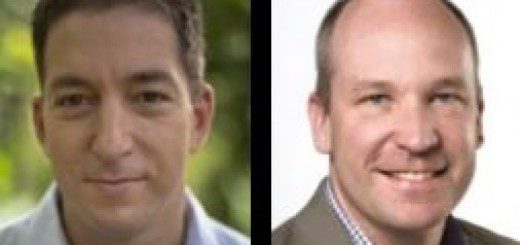Glenn Greenwald speaks on working with Snowden and integrity in journalism
Greenwald emphasized the importance of security measures in dealing with sources, but also placed great value on the importance of sources themselves. In particular, Greenwald strongly defended the integrity of Edward Snowden, the information he provided, and the way he handled himself coming forward.
By Laura Tribe, for Canadian Journalists for Free Expression
Earlier this week, journalist Glenn Greenwald sat down with The Globe and Mail’s David Walmsley at the Glenn Gould studio in Toronto to talk about his book, No Place to Hide, and his experiences meeting and working with Edward Snowden.
Introduced by the CBC’s Jennifer McGuire, and the Toronto Star’s John Cruickshank, the evening began with a video of clips showcasing the strong stance with which Greenwald took the U.S. government (and others) to task.
Speaking to a crowd full of journalists, Greenwald emphasized the importance of security measures in dealing with sources, but also placed great value on the importance of sources themselves. In particular, Greenwald strongly defended the integrity of Edward Snowden, the information he provided, and the way he handled himself coming forward.
He described his first experiences with Snowden, which began with anonymous messages from someone named “Cincinnatus,” (Snowden) encouraging Greenwald to implement encryption for secure communications. Although at first Greenwald failed to adopt the secure communications tools, he was finally securely connected with Snowden through documentary filmmaker Laura Poitras, who travelled with Greenwald to Hong Kong for their initial meeting.
Greenwald noted his surprise on actually meeting Snowden, saying that he was skeptical of a whistleblower so young and early into his career. This skepticism disappeared through a lengthy process of questioning Snowden and reading through the documents. That process is well documented in Laura Poitras’ new film, Citizenfour.
It’s hard enough to be a whistleblower, but to safely come out against the U.S. government at the time seemed impossible. Greenwald and Poitras knew the risks they were taking with this story, but they also knew Snowden would take the brunt of the backlash and wanted him to be clear on the potential consequences before moving forward.
Once the first documents went public, Greenwald was impressed at how Snowden avoided the spotlight; he turned down countless interviews to keep the focus off himself and on the information that he disclosed. He didn’t want to distract from the government’s actions.
Greenwald believes that Snowden’s experience has shown that it is possible for whistleblowers to come forward and question the government without an automatic life sentence. Snowden remains a vital piece of the conversation on changing surveillance practices, his girlfriend has joined him in Russia, and he continues to live a full life.
Despite the secure nature of the documents he continues to work with, Greenwald has no fears of over-disclosing or leaking sensitive information. Rather, he’s worried that he is not disclosing enough.
When asked how many of the Snowden documents he had yet to publish, Greenwald was hesitant to disclose a specific number, saying that it helped the authorities too much. But he did confirm that he had published “under 10 per cent” of the files he had received, and was working to increase that number substantially in the near future.
Looking at how things have changed since his first encounter with Snowden, Greenwald didn’t seem to regret any of the conversations that have arisen as a result, even those that questioned his role in the process. Instead he actually welcomed the debate, saying they lead to a strong discourse on the role of government and media and the sometimes unhealthy relationships between the two.
Despite being the target of harassment and extreme criticism for his work, Greenwald stands by his actions, and the right of those to speak freely without restrictions on free speech.
To conclude the evening, Greenwald recalled his appearance at the Munk Debate in June where he and Reddit co-founder Alex Ohanian faced off against former CIA Director Michael Hayden and American lawyer Alan Dershowitz. Hayden and Dershowitz were Greenwald’s dream debate, he said that if he had the chance to debate someone again, his next choice would be President Obama.
The event, organized by the Canadian Journalism Foundation, concluded with a standing ovation, and a reception where many had the opportunity to meet with Greenwald and ask him their lingering questions.
Laura Tribe is CJFE’s national and digital programs lead. Follow her on Twitter @ltribe.

